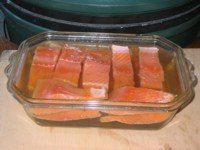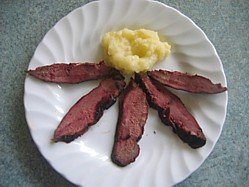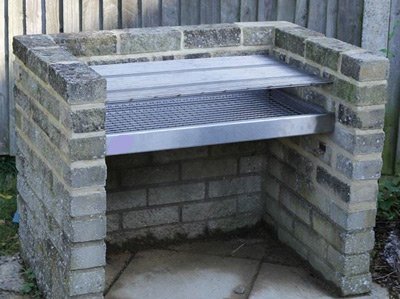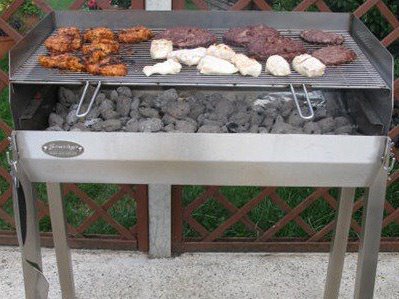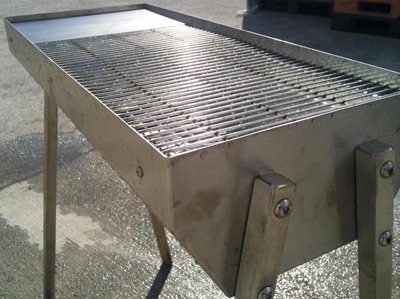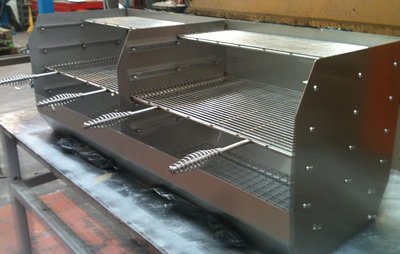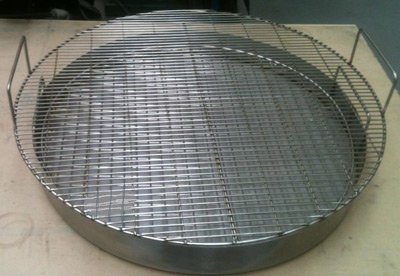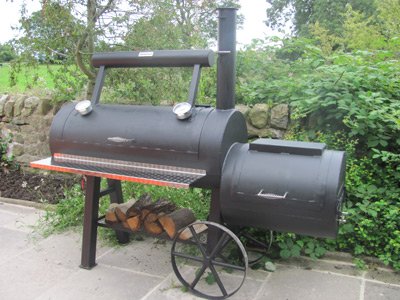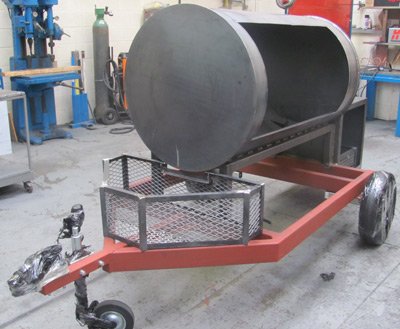- Recipes Home
- Brines
Brine Recipes
Below you'll find some great brine recipes that you can use as a pre-cursor to your smoking activities and also if you fancy trying your hand at curing bacon or ham. You'll also find out about how to brine and why it works.
Brining or wet curing meat and fish has been around for many years and effectively has three purposes:-
- To help preservation by driving moisture out of the food
- To tenderize
- To add flavor
Whether we are using brine to preserve or add moisture and flavour is dependent on the meat and the concentration of the brine used.
What Is Brine And How Does It Work?
Brine is a solution of water and salt (other flavourings may be added) and it serves to dehydrate and therefore promote weight loss, so why do many people talk about brine adding succulence and tenderness to food? I learned about osmosis as a student and how water moves through a semi permeable membrane from an area of high concentration to one of low. If osmosis were the process then surely a brine would serve to dehydrate the meat?
Without question, brine is a salt solution that can be mixed to various concentrations to support the drying and preserving of food. The issue really is how long to brine and most importantly the concentration of the brine.
Using A Brine Injector Pump
A brine injector looks pretty similar to a large syringe and to all intents and purposes that's what it is. It's particularly useful for getting brine into large thick pieces of meat like a ham.
If you're going to brine a large piece of meat in a reasonably strong brine you stand the risk that the meat to the outside will be overly salty and the meat closest to the bone won't get any effect from the brine. A brine pump takes care of this.
Depending on how much brine you want to inject there are pumps that have a continuous feed of brine as opposed to a barrel that you fill up. It have to be said though that this type of pump is expensive and probably overkill for home use.
It's also particularly useful for hams where you use nitrates in the brine to give it that pink color. Using a brine injector pump can help you get an overall pink balance and avoid what looks like discoloration close to the bone.
One last point of use. Don't use a brine pump in isolation, you'll still need to fully immerse your meat in a brine bin for the best results.
How Do You Use It?
Just like a doctor with a syringe, insert the needle into the meat and target the area closest to the bone. As you put pressure on the plunger to squirt the brine into the meat, gently allow the “needle” of the brine injector to exit the meat, that way you'll get a steady flow. As the needle exits the meat, give the hole where the needle was a little nip and this will seal the brine in the meat.
Looking After Your Pump
Brine is not a disinfectant, it's a great breeding ground for bacteria so always wash it before use and again thoroughly after use. In addition, if you haven't used your brine pump for a couple of months, soak it in water so that the plunger becomes soft and spongy as this will help the injection process.
Brine For Smoking Fish And Red Meat
When using brine as a wet cure for meat (ham and bacon) or fish, the objective is definitely to dehydrate and the concentration of the brine will be strong - 70-80%. In these instances, brining is done for a relatively short period of time and is usually followed by rinsing (to halt the dehydration) and a drying process.
The science behind the dehydration is osmosis ie. the concentration of water in the brine is lower than the concentration of water in the muscle cells of the meat or fish.
There are four factors that affect brining time for fish:-
- The strength of your brine
- The thickness of the fish
- How oily the fish is. Oily fish absorb salt less quickly
- Personal taste – and only you can judge this
You'll find that most of my cold smoked fish recipes use a brine strength of 70-80% and it's a very simple brine.
The other factors contribute to differences in the time that the fish spends in the brine and this is best demonstrated by looking at how brining times vary between different species.
- Trout = 2-4 hours
- Herrings = 15 minutes
- Haddock = 10 minutes
- Mackerel = 1-2 hours
- Eel = 20 minutes
You'll find more detail in each of my smoked fish recipes.
When it comes to hot smoking it's mainly about salmon. I've got the standard brine for salmon together with some additional seasonings.
It's similar for bacon and ham in that it comes down to personal taste however there is a general rule of thumb of 4 days per inch and generally no more than 10 days.
Drying Bacon & Ham
Always thoroughly wash off the brine before drying / maturing because any salt left on the the meat will attract moisture and mould will grow on your bacon.
You can find the full air dried bacon recipe here.
Brine For Smoked Turkey
This is a completely different brine concentration and the science behind it is completely different too. The brine is much weaker, usually anywhere between 5-20%, the active ingredient is still salt but it's not dehydration or an osmotic effect.
The salt serves to denature the protein sheaths around the muscles in the meat. Normally these muscle cells are tightly bound so not much water is in them but when the protein sheath is denatured, the whole thing relaxes and so water is absorbed (and retained).
To further enhance the water retention during cooking, the denatured protein sheaths don't contract as much as they normally would when exposed to heat so less moisture is "squeezed out" during the cookout.
Note: - Because the brine concentration is so low it is arguable as to whether there is also an osmotic effect taking place too and there probably is. If it were exclusively osmosis however it would stand to reason that pure water would be the best for soaking your turkey, yet studies have shown that a weak brine concentration delivers better water retention than pure water. Therefore something else has to be having the effect.
How Long To Brine Turkey?
This is down to the strength personal taste. When you read my brine recipes below you'll see that
they will normally be in the region of 10–15% strength and this means
that you can brine for a reasonable length of time ex. overnight or 1
day without too much concern. Start with overnight and build you way up
both in time and concentration.
Drying Turkey
Stuff the cavity with paper towels and wrap more around the outside of the turkey. When it is as dry as you can get it, remove the paper towels and place your turkey in the refrigerator overnight (standing on its neck) and this will maintain the moisture in the meat yet at the same time dry the outer skin.
You can also air dry it by hanging for 12 hours. First tie the wings and then hang it by the legs. Finally to prepare for smoking ensure that the neck is nicely open so that the smoke can pass through the bird.
Brining Tips & Techniques
- Remember, brining isn't the everyone's taste so if you don't like it, just accept that others do.
- Use a plastic container (never metal as this will tarnish the flavour) twice as big as the volume of ingredients.
- Boil the water for your brine and add the salt and sugars whilst warm so it dissolves easily.
- Allow your brine to cool fully before using it. Brining should always be done under refrigeration conditions.
- Ensure all the meat is fully immersed in the brine, use weights if necessary.
- Overhaul the meat each day ie. move it around in the brine.
- Don't leave food in brine for too long when you first start experimenting with brine.
- When using a concentrated brine, use an electronic timer to ensure that you get your timings right.
- Always make notes about the brine concentration and timings. That way you can refer back and refine the process to what best suits your tastes.
Turkey Brine Recipes
The Most Simple Of Turkey Brine Recipes
If you're new to brining turkey then this is a good place to start because this recipe is straight forward and it will allow you to easily gauge the results. If you then want it a bit saltier for the next time, you can either add more salt or it in the brine for longer. It really is down to personal taste.
Yield:- 1 US gallon (3.75 litres)
Preparation Time:- 20 minutes
Brining Time:- overnight
Drying Time:- 24 hours
Total Time:- 36 hours (approx)
Allergens:
None
Ingredients:-
- 1 gallon (3.75 litres) cold water
- 1 cup (240g) non iodized crystallised salt
- ½ cup (120g) dark brown sugar
Method:-
Dissolve the salt and sugar in half of the water by bringing it to boil in a large pan. Then allow to cool, transfer to your brining bin and add the remaining water.
Variations On The Theme - Recipe #1
What can I say about this brine for smoked turkey other than it is perfect for the beginner and “you've got to try it!”.
Yield:- 2 US gallons
Allergens:
None
Ingredients:-
- 3.75 litres or 1 US gallon vegetable broth
- 3.75 litres or 1 US gallon water
- 240g or 1 cup non iodized crystallised salt
- 240g or 1 cup brown sugar
- 1 tablespoon peppercorns
- ½ tablespoon allspice berries
- 1 inch cube fresh ginger roughly chopped
Method:-
Take a large pan and mix up the salt and sugar with the water, bring to the boil and stir to ensure that all the solutes have fully dissolved. Once cool pour the mix into your brining bin and add the rest of the ingredients.
Smoked Turkey Brine Recipe #2
Relatively speaking, this is a weak brine. I've recommended that the brining period be 8 – 12 hours but you can go for 24 hours if you have an extra large turkey (over 14 pounds) or indeed go for less if you don't want too much salt. I certainly would recommend that you err on the side of caution particularly if this is your first brining experience.
Brining for additional moisture just requires your bird to be immersed in the brine for a reasonable amount of time, overnight being perfect. The amount of salt required to deliver the additional moisture retention is actually quite small (6%), this recipe is a little stronger at just over 10%.
Yield:- 2 US gallons
Preparation Time:- 20 minutes
Marinade Time:- overnight
Cooking Time:- n/a
Total Time:- 1 day
Allergens:
Worcestershire sauce contains both fish and gluten.
Ingredients:-
- 7.5 litres or 2 US gallons water
- 240g or 1 cup non iodized salt
- 1 bulb garlic, all cloves peeled and chopped
- 1 tablespoon ground black pepper
- 120ml or ½ cup Worcestershire sauce
- 100g or ½ cup brown sugar
Method:-
Boil up 2 litres (quarts) of the water with the salt and sugar to ensure that all has dissolved then allow to cool.
Pour the balance of the water into the brining bin together with your sugar / salt mix and add the rest of the ingredients. Stir, and you're smoked turkey brine is ready to go.
Apple Turkey Brine Recipe
There's a whole lot going on in this apple turkey brine recipe including some great winter flavorings such as cloves, ginger and of course the citrus element.
Preparation Time:- 20 mins
Marinade Time:- overnight
Cooking Time:- n/a
Total Time:- 1 Day
Allergens:
None
Ingredients:-
- 2 quarts (litres) apple juice
- 1 pound (454g) brown sugar
- ½ cup (120g) non iodized crystallised salt
- 3 quarts (litres) cold water
- 4 oranges, quartered
- 4 ounces fresh ginger, un-peeled and thinly sliced
- A dozen whole cloves
- 6 bay leaves
- 6 large garlic cloves, peeled and crushed
Method:-
Place the water, sugar and salt in a pan and heat until thoroughly dissolved and then allow to cool.
Pour the brine solution into your brining container and add the remainder of the ingredients (squeezing the orange quarters to release the juice before throwing them in) and stir. Place your brine mix in the refrigerator to ensure that it is fully cooled prior to immersing your turkey.
Honey Turkey Brine Recipe
Sweet honey turkey brine recipe infused with spice, could you ask for more?
This one is approximately a 15% strength brine so perfect for an overnight soaking.
Yield:- 1 US gallon (3.75 litres)
Preparation Time:- minutes
Marinade Time:- overnight
Cooking Time:- n/a
Total Time:- 1 day
Allergens:
There are no recognised allergens in this turkey brine recipe but you may be cooking for someone who doesn't eat nitrite which can be found in the curing powder.
Ingredients:-
- 1 gallon (3.75 litres) water
- ½ cup (120g) non iodized salt
- 1 teaspoon curing powder
- 1 cup (340g) honey
- 3 bay leaves
- ¼ teaspoon ground cloves
- ¼ teaspoon ground cinnamon
Method:-
Dissolve the salt in a quart of the water by stirring and bringing it to the boil in a large pan. Add the honey too whilst warm so that this fully dissolves too.
Then allow to cool down to room temperature – you can do this quickly adding the balance of the water in the form of iced water.
Once cool, transfer to the brining bin, stir in the rest of the ingredients and you're ready to rock n roll. Immerse your turkey in the brine for 8 – 12 hours and ensure that everything is kept refrigerated.
Chili Brine Recipe
If you like it hot then my chili brine recipe for turkey is here to give your Thanksgiving an extra kick!
Yield:- 2 US gallons (7.5 litres)
Preparation Time:- 5 minutes
Brining Time:- overnight
Drying Time:- 24 hours
Total Time:- 2 days
Allergens:
None
Ingredients:-
- 2 US gallons (7.5 litres) water
- 1 cup (240g) crystallised non iodised salt
- 1 cup (240g) white sugar
- 2 tablespoons dried chili flakes
Method:-
As with the other recipes, use a large pan to dissolve the salt and sugar in warm water and then allow to cool. When cool, transfer to the brining bin and brine overnight in the refrigerator.
Oriental Style Brine
Just check out the ingredients and you'll see why it's "Oriental Style"
Yield:- 2 US gallons or 7½ litres
Preparation Time:- 30 minutes
Marinade Time:- overnight
Cooking Time:- n/a
Total Time:- 1 day
Allergens:
Soy sauce is brewed from soya beans and also contains gluten.
Ingredients:-
- 2 US gallons or or 7½ litres water
- 2 cups or ½ Kg brown sugar
- ½ cup or 120g non iodised salt (crystallised not granules)
- 1½ cups or 350ml soy sauce
- 1 tablespoon garlic salt
- 1 tablespoon freshly ground black pepper
- 1 tablespoon cayenne pepper powder
- 1 tablespoon Chinese five spice
Method:-
Dissolve the sugar and salt in 2 quarts (litres) of the water by boiling it up in a large pan and once dissolved, allowing it to cool.
When cool, transfer the concentrated brine to your brining bin add the rest of the water and stir in the remainder of the ingredients.
Fish Brine Recipes
Below you'll find a couple of brine recipes for hot smoked salmon. I also have a brine recipe for hot smoked mackerel and the details are in the full article, just click on the aforementioned link.
Brine Recipes For Hot Smoked Salmon
These brines work differently to the turkey brine recipes in that the salt is in there to help remove some of the water and aid the movement of the sugar that will act as a tenderizer. There's very little to this first recipe in terms of the ingredients, the main challenge is to ensure that you brine your salmon for the right length of time.
It's a strong brine so getting the timing right can make a big difference in terms of how salty the final results are, of course the degree of saltiness is down to individual taste so this is one of those recipes where you monitor the amount of time that the fish is in the brine (and the thickness of the fish fillet), taste the results and then gradually vary to your taste.
At the end of this section I've also included some approximate timings for how long you need to brine your salmon before drying and smoking. Remember, this is just a guide and your own taste may be different to mine so you might not get it right first time.
To ensure that you continue to get better and better at brining, keep a pencil and paper handy so that you can note the brine strength, the weight of the fish and the time that you brine it for. That way you can learn by your mistakes and finally find the perfect flavor for you.
Before the additions, let me just remind you of the basic brine recipe. Measures are in both metric and imperial units.
Allergens:
There are no allergens in this salmon brine recipe.
Ingredients:-
Imperial
- 4 Quarts water
- 1½ cups brown sugar
- 3½ cups non iodized salt
Metric
- 4 Litres water
- 370g brown sugar
- 1090g non iodised salt
Once mixed, put this brine aside to chill.
Method:-
Once the brine is chilled, you can immerse your salmon in the brine (timings below).
Use an electronic timer with an alarm to monitor your brining time. To brine a good quantity of salmon is going to cost you a lot of money and the last thing that you need is to forget about it and end up with a salty offering.
Make sure that your salmon is fully immersed.
Once used, throw the brine away for two reasons:
- The salinity will change after the salmon has been immersed so you cannot guarantee the concentration (and therefore brine timing) for a future batch.
- The brine will spoil and smell after a couple of days
Optional Additions To The Salmon Brine
It's not really a second recipe, just a few more flavourings added to the basic brine mix.
- 15g or 1 tablespoon onion powder
- 15g or 1 tablespoon garlic powder
- 15g or 1 tablespoon white pepper
Measure the seasonings into a small saucepan and add a small amount of your mixed brine so that you can make a paste. Bring it to the boil and then allow to cool before chilling and then adding to your already chilled brine mixture.
Suggested Brine Curing Times For Fish Fillets
| Thickness | Time |
|---|---|
| ¼ inch (6mm) | 5 minutes |
| ½ inch (12mm) | 15 minutes |
| ¾ inch (19mm) | 35 minutes |
| 1 inch (25mm) | 45 minutes |
| 1¼ inches (32mm) | 1 hour |
Suggested Brine Curing Times For Whole Fish
Skin on, heads attached 45 minutes
Skin on (slits every ¾ inch or 20mm) 30 minutes
All that remains now is to dry and smoke your fish. Dry it by placing it on a cake cooling rack in your refrigerator overnight.
To smoke your salmon it's a two step process. Step 1 is to gradually bring your smoker temperature up to 80°C or 175°F over a period of about 30 minutes and then step 2 is to further smoke the salmon for another 30 minutes.
Brine For Game
Especially when smoking wild duck (or goose) it’s really important to brine first because wild duck has little fat on it. The acidity (it's malic acid in apples) serves both to tenderize the meat and also to keep the meat from drying out when cooking.
Compare this with my grilled duck breast recipe which really calls for a good fatty breast.
For the apple juice brine you need the following ingredients and don't be afraid to experiment with different herbs depending on what you've got available. Mixed herbs work just a well as the thyme that I've used.
Yield:- 500ml or 1 pint
Preparation Time:- 5 minutes
Marinade Time:- overnight
Cooking Time:- 1 hour
Total Time:- 1 day
Ingredients:-
- 500ml or 1 pint apple juice
- 2 teaspoons non iodized salt
- 1 bayleaf
- 2 teaspoon dried thyme
Use this link for the full Smoked Duck Breast
Use this link for my Smoked Goose Brine
Jerky
I've included jerky here because it's arguable whether jerky uses a brine or a marinades. On one hand I've described them as marinades but then again the mix is similar to the bucket chemistry techniques used for brine recipes.
Homemade Jerky RecipesConcentrations Of Brine Solution
There are two ways to determine concentrations of brine solution, one is to measure discrete quantities of salt and water whereas the other is to use a salinometer.
I use the former of these two because I make up brine as and when I need it, I don't have a production line of foods for curing and smoking. All I need to do is decide on the strength of brine that I need, how much I need and then use the brine table determine the amount of salt that I use to make up my mix.
You will note that all measurements are by weight and not volumetric (eg. cups) this is so that these tables work whatever the density of salt you are using.
This is a very important point if (heaven forbid!) you use someone else's brine recipes that measure Kosher salt in cups. In this instance you must use Kosher salt and the quantity specified, you cannot substitute a regular non iodised salt. There's nothing wrong with using non iodised salt it's just that Kosher salt has larger crystals so one cup of Kosher salt will weigh significantly less than one cup of regular salt.
Imperial Measurements (Ounces)
| % Concentration | 1 Quart | 2 Quarts | 3 Quarts | 4 Quarts |
Metric Measurements (Grammes)
| % Concentration | 1 Litre | 2 Litres | 3 Litres | 4 Litres |
Note: - Many will tell you that once a brine has been used you must throw it away, this is fair comment for a weak turkey brine but not true for a bacon brine. Provided you bring it back up to strength, you can use your solution many times but it must be filtered of all debris and kept refrigerated. Don't leave it lying around – that's a sure fire way to cause food poisoning.
Both tables above provide the correct quantities for a fresh brine mix but once used, you cannot assume that the strength of the solution is maintained.
If you're going to use your salt water mix for more than one wet curing session then you will need a salinometer to bring your solution back to your preferred strength at the end of each batch.
Not Recommended
If you haven't got scales and a measuring jug then (get some!) there is a very simply method to determine a 50% brine solution and that is to use an egg or potato. Just place the egg or potato in water and mix in your salt, when the egg (or potato) rises to the surface, you've reached 50% strength (it's crude but it works).

